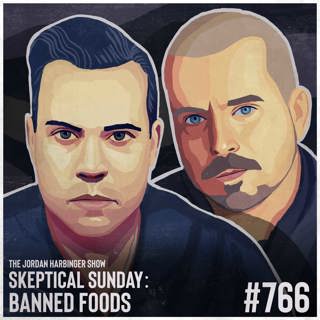Om avsnittet
Why are so many of the snacks and drinks offered as safe for consumption in the United States wholly banned in other parts of the world? How bad could our favorite foodstuffs actually be? Welcome to Skeptical Sunday, a special edition of The Jordan Harbinger Show where Jordan and fact-checker, comedian, and podcast host David C. Smalley break down a topic that you may have never thought about, open things up, and debunk common misconceptions. Editor's note: A previous version of this show's notes erroneously declared that aspartame was banned in the EU. We are in the process of correcting this and apologize for the error. Full show notes and resources can be found here: jordanharbinger.com/766 On This Week’s Skeptical Sunday, We Discuss: Coffee Mate's liquid version is banned in Europe due to the presence of trans fats (found in hydrogenated vegetable oils) that can lead to heart disease. While the US requires warning labels for these foods, they are still available to consumers. Mexican and most European cola brands use cane sugar, while American Coke uses high fructose corn syrup, which is regulated in the EU. High fructose corn syrup has been linked to health issues such as insulin resistance, diabetes, and cardiovascular illnesses. Aspartame is a low-calorie sweetener found in many US foods and drinks, including diet sodas and gum. It contains phenylalanine, which can cause problems for people with a rare genetic condition called PKU. While evidence is still being gathered, there have been concerns about the potential health effects of certain artificial food dyes, particularly their potential to cause hyperactivity in children. In the European Union, these dyes are banned from use in food products, while they are widely used in the United States. The EU has banned the use of growth hormones in cows due to concerns about potential health risks to humans and animals, as well as potential negative impacts on the environment. In the United States, however, they're commonly used in the dairy and meat industries to promote faster growth and increase milk production in cows. Connect with Jordan on Twitter, Instagram, and YouTube. If you have something you'd like us to tackle here on Skeptical Sunday, drop Jordan a line at jordan@jordanharbinger.com and let him know! Connect with David at his website, Twitter, Instagram, TikTok, and YouTube, and make sure to check out The David C. Smalley Podcast here or wherever you enjoy listening to fine podcasts! If you like to get out of your house and catch...
